Kiribati, a small nation consisting of 33 Pacific island atolls, is forecast to be among the first countries swamped by rising sea levels. Nevertheless, the country recently made an astounding commitment: it closed over 150,000 square miles of its territory to fishing, an activity that accounts for nearly half the government’s tax revenue. What moved the tiny country to take this monumental action? President Anote Tong, says Kiribati (“Kir-ee-bas”) is sending a message to the world: “We need to make sacrifices to provide a future for our children and grandchildren.”
President Tong isn’t mincing his words. Kiribati looks to make the ultimate sacrifice by mid-century, when much of the country is projected to be largely uninhabitable. Rising seas will contaminate freshwater supplies, ruin agriculture lands, and erode beaches and villages, forcing its people to flee. Kiribati has done nothing to earn this fate—its greenhouse gas emissions are negligible and its population barely tops 100,000. Yet it is already looking at buying land in other countries for eventual resettlement of a substantial proportion of its population.
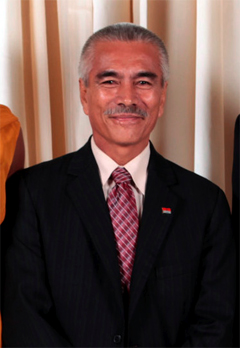 Anote Tong. Photo by Lawrence Jackson. |
Kiribati is among the world’s poorest countries. It has few natural resources other than fish and copra, the dried meat of coconut. It does however have of some of the world’s most pristine coral reefs and healthiest fish stocks, which have now become the basis of its contribution to the well-being of the planet: the Phoenix Islands Protected Area (PIPA), which at 408,250 square kilometers is the largest marine World Heritage site.
PIPA is part of President Tong’s bigger, more ambitious initiative, the Pacific Oceanscape—38.5 million square kilometers (24 million square miles) of ocean, an area larger than the land territories of the United States, Canada and Mexico combined. Over the past two years, President Tong has brought together 16 Pacific Ocean nations to develop the initiative, which seeks to maintain ocean health by improving management of fisheries, protecting and conserving biodiversity, furthering scientific understanding of the marine ecosystem, and reducing the negative impacts of human activities.
President Tong’s efforts in the face of incredible adversity has earned him considerable respect in the conservation world. Dr. Greg Stone, Chief Ocean Scientist and Senior Vice President for Marine Conservation at Conservation International, likens him to the “Teddy Roosevelt of Oceans,” in that President Tong is doing for oceans what the 26th president did for land conservation in the United States around the turn of the 20th century.
“What we are seeing here is the dawning of a new era for marine management,” he said.
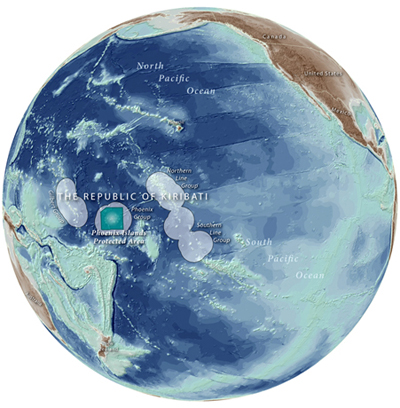 Image courtesy of phoenixislands.org |
President Tong brought his message to San Francisco last week for the California and the World Ocean 2010 conference. Presenting along side U.S. Representative Sam Farr (D – CA), NOAA Administrator Jane Lubchenco, philanthropist David Rockefeller Jr., oceanographer Sylvia Earle, and hundreds of marine scientists and conservationists, President Tong urged the world to take action to protect oceans and avoid climate change.
“There is obviously a need to consolidate all of the efforts in ocean governance in the Pacific and indeed in the world if we are to successfully manage and conserve these resources for present and future generations,” he said.
Following his keynote address at the conference, President Tong discussed climate change and marine conservation with Mongabay.com’s Rhett Butler.
The following is a short excerpt of the interview with President Tong.
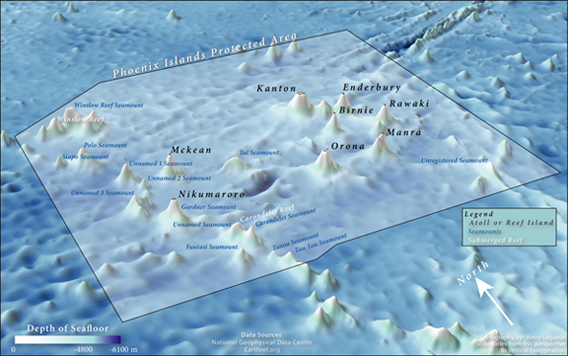 Image courtesy of phoenixislands.org |
AN INTERVIEW WITH HIS EXCELLENCY ANOTE TONG, PRESIDENT OF KIRIBATI
mongabay.com: How do the people of Kiribati feel about the fact that their fate lies in the hands of people in far-away countries?
President Anote Tong: There is a sense of injustice, but also an understanding that until recently, people weren’t aware of the impact of their actions. However knowing what we do today, carrying on as business-as-usual is irresponsible and immoral. Failing to take action borders on an act of criminality.
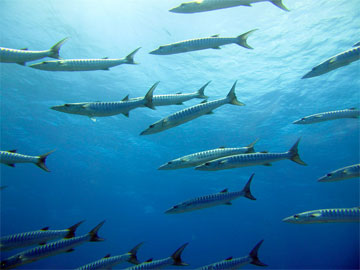 Blackfin barracuda school near McKean Island in the Phoenix Islands Protected Area. © Randi Rotjan, New England Aquarium. More than 200 types of coral, 500 unique fish species, 18 marine mammals and 44 bird species have been documented in the Phoenix Islands area, according to Conservation International. |
But we are not the only ones facing this future. Other island nations, as well as low-lying countries and coastal areas, are also at risk.
We could all be victims—even the United States, with Hurricane Katrina and fires in California.
mongabay.com: Is there a feeling there should be help from outside to cope with the effects of climate change?
President Anote Tong: Kiribati is a highly Christian nation. For a long time people saw flooding and other damage as acts of God. But now some people are coming to the realization that sea levels are rising and its only going to get worse. People are mobilizing. They want help.
Now there is a feeling that the people who contribute most to the problem should be part of the solution.
mongabay.com: Is there a message you would like to convey to the broader public?
President Anote Tong: We must get away from the idea that one person, one action cannot make a difference. One million is 1+1+1 and so on. Every person and every action is important.
The Pacific is one ocean. What you throw in the sea in California will end up on our shores. So we need to work together.
mongabay.com: If you could ask for anything, what would it be?
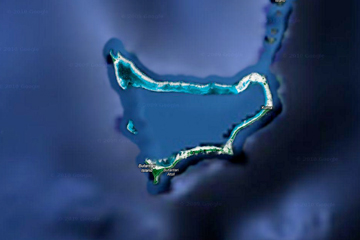 Butaritari, an atoll located in the Pacific Ocean island nation of Kiribati. Image courtesy of Google Earth. |
President Anote Tong: We are asking the people of the world to make a sacrifice. The fate of our people, our culture, our memories is at stake. I don’t think anyone wants to drown a people, yet that is what will happen.
Climate change is a moral challenge, perhaps the greatest since slavery. The international community readily condemns terrorism, genocide and nuclear proliferation, but why can’t we see the injustice of our inaction on climate change?
As a country on the frontline of climate change, we are going to be one of the first affected by the lack of action by others. So we are asking people to run the extra mile on the weekend, to make sacrifices.
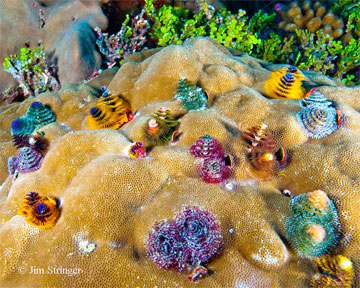 Brightly colored christmas tree worms (Spirobranchus spp.) delicately filter feed from their home in a Porites spp. coral colony on Enderbury Island. © Jim Stringer. Within the Phoenix Islands Protected Area lie eight of atolls, two submerged reef systems, approximately 14 submerged seamounts (underwater mountains) as well as deep-sea and open-ocean environments which have been described as among the most isolated and free from human impact left on the planet, resembling what the ocean might have looked like a thousand years ago, according to Conservation International. |
To this end, Kiribati has made a sacrifice. We established PIPA, which closed much of our territorial waters to fishing. We had to fight our own internal political battles and opinion on this decision, but it is a very large statement on our part.
Fishing accounts for about 45 percent of government tax revenue and is an important source of livelihoods.
Ours is a contribution to biodiversity as well as marine fish stocks. Conservation of our fisheries resources brings benefits to the rest of the ocean. No catch zones boost fish populations in outside areas.
Through the Pacific Oceanscape, we have brought together 16 countries to take similar measures to protect ocean resources. The Oceanscape is larger than the combined landmass of the United States, Canada, and Mexico.
The idea of the Oceanscape is so logical. Countries that share the Pacific should have been collaborating on issues a long time ago.
mongabay.com: Will PIPA attract tourists to Kiribati?
President Anote Tong: Our biggest problem for tourism has been lack of regular flight service, but we are working on this. We are two hours from Hawaii.
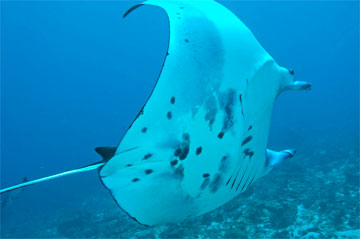 A manta ray gracefully swimming near Kanton Island. © Jim Stringer. |
PIPA has certainly created a lot of publicity, especially around the issue of climate change facing Kiribati, which is important since how can you care about a country you don’t know?
There is much we can offer tourists—the attraction is definitely there. We have some of the best fishing in the world and our reefs are some of the most pristine. There is very little habitation or disturbance, which makes the area a living laboratory for climate change research. It can serve as a baseline for studies.
mongabay.com: Have Kiribati’s reefs experienced coral bleaching?
President Anote Tong: I have certainly seen bleaching. Whether it is the product of climate change, I do not know.
However some reefs are recovering so that gives us hope.
mongabay.com: Do you have difficulty policing your waters against illegal fishing fleets?
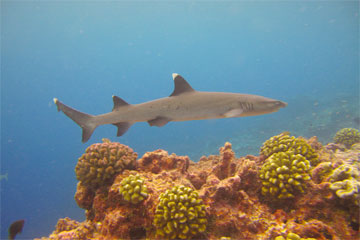 Reef shark. © Randi Rotjan, New England Aquarium |
President Anote Tong: We have a huge exclusive economic zone, 3.5 million square kilometers (1.35 million square miles) and only a single patrol boat, so indeed it is a problem. But we have an agreement with the United States—we have observers aboard their ships. We also get assistance from other countries.
We have a plan to increase surveillance through overflights by neighboring countries.
mongabay.com: What gives you hope?
President Anote Tong: I refuse to believe that any individual with a conscience would deliberately continue on a business-as-usual path knowing that their actions would result in the demise of others.
It is important not to forget we are talking about the fate of a people here. We’re not talking about polar bears. I think the polar bears are precious and I do not wish to see them disappear. But nor would I want to see our people disappear.
Related articles
Coral reef survival depends on the super small, an interview with Forest Rohwer

(08/30/2010) If you take a teaspoon and dip it into the ocean what will you have? Some drops of lifeless water? Only a few decades ago this is what scientists would have said, however, the development of increasingly powerful microscopes have shown us a world long unknown, which has vital importance for the survival of one of the world’s most threatened and most treasured ecosystems: coral reefs. A single milliliter of water is now known to contain at least a million living microbes, i.e. organisms too small to see without a microscope. After discovering their super-abundant presence, researchers are now beginning to uncover how these incredibly tiny life-forms shape the fate of the world’s coral reefs.
Malaysia preparing to take big step backward on energy policy

(08/13/2010) I write to you as a deeply concerned and saddened citizen of Malaysia. For most of the 45 years of my life, I have been proud to be Malaysian. Recently, I have become heartbroken to be Malaysian. I am profoundly grateful to write this with the support of both my local communities in Sabah, Malaysian Borneo and California, U.S.A., and a larger world community. That said, I take full ownership of and sole responsibility for the views articulated in this letter; I express them from my stand as a mother, an earth citizen and a leader.

(07/29/2010) “President Obama called it ‘the worst environmental disaster America has ever faced.’ So I thought I should face it and head to the Gulf”—these are the opening words on the popular blog Guilty Planet as the author, marine biologist Jennifer Jacquet, embarked on a ten day trip to Louisiana. As a scientist, Jacquet was, of course, interested in the impact of the some four million barrels of oil on the Gulf’s already depleted ecosystem, however she was as equally keen to see how Louisianans were coping with the fossil fuel-disaster that devastated their most vital natural resource just four years after Hurricane Katrina.
Coral reefs doomed by climate change
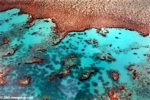
(07/22/2010) The world’s coral reefs are in great danger from dual threats of rising temperatures and ocean acidification, Charlie Veron, Former Chief Scientist of the Australian Institute of Marine Science, told scientists attending the Association for Tropical Biology and Conservation meeting in Sanur, Bali. Tracing the geological history of coral reefs over hundreds of millions of years, Veron said reefs lead a boom-and-bust existence, which appears to be correlated with atmospheric carbon dioxide levels. With CO2 emissions rising sharply from human activities, reefs—which are home to perhaps a quarter of marine species and provide critical protection for coastlines—are poised for a ‘bust’ on a scale unlike anything seen in tens of millions of years.
Amazing reefs: how corals ‘hear’, an interview with Steve Simpson

(07/21/2010) Corals aggregate to form vast reefs, which are home to numerous species and provide vital ecological services such as protecting shorelines. However, coral reefs are one of the most threatened ecosystems in the world due to many factors, such as global warming and ocean acidification. Recent research by Simpson and his team of scientists has shown that corals, rather than drifting aimlessly after being released by their parent colonies and by chance landing back on reefs, instead find their way purposefully to reefs by detecting the sound of snapping shrimps and grunting fish on the reef. However, that discovery also means that the larvae might struggle to find reefs when human noises, like drilling or boats, mask the natural ocean sounds.